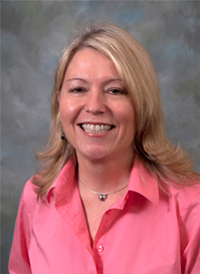This blog was cross posted from the Disability.Gov blog.
By Guest Blogger Betsy Beaumon, President, Benetech
The digital revolution and ongoing advances in technology have made it possible to get more content, in more ways, to more people. This could truly be a golden age of access to books and information for all. As President of Benetech, a nonprofit that harnesses technology as a force for social good, I’m always seeking new ways to enrich and improve more lives. Our social enterprise business model aims to create financially sustainable projects that measure success in the number of lives changed for the better.
Through our four programs—Global Literacy, Human Rights, the Environment and Benetech Labs—Benetech works at the forefront of building human centered software-for-good tools for individuals with disabilities, human rights activists and environmental sustainability fieldworkers.
Today, I’d like to share highlights from our Global Literacy Program and how it creates new and better opportunities for people with disabilities. Thanks to the support of the U.S. Department of Education, Office of Special Education Programs (OSEP) and other generous funders, Benetech acts on the belief that literacy and education are not a privilege, but a basic human right.
We established the Global Literacy Program to address the needs of the millions of people who are denied this right and face tremendous barriers of access to information. This includes people with print disabilities, such as those affected by learning differences, like dyslexia, or people with physical or visual disabilities. We also serve others who have developmental disabilities and have not been taught to read into adulthood through additional services.
This week, our team is in Washington, D.C., for briefings with senior leaders of the Department of Education. We are thrilled to demonstrate to these government officials some of our products and tools, made possible thanks to their support. This will include an “image slam”—a hands-on session in which they will use Benetech’s web-based application, Poet, to describe images in a book that will then become available to hundreds of thousands of readers with disabilities around the country. Since 2012, volunteers at similar image slam events have described nearly 45,000 digital images using Poet.
Poet is but one product of Benetech’s OSEP-funded DIAGRAM Center, a research and development initiative that makes it easier, cheaper and faster to create and use accessible digital images—especially complex images, such as charts, graphs, maps, rich illustrations and mathematical formulas. In partnership with leaders in the corporate, technology, university, publisher and nonprofit communities, we are exploring and developing cutting-edge image accessibility technology solutions for text alternatives as well as different learning modalities, such as tactile graphics, sonfication, haptic interfaces and 3D printed images.
With support from the Institute of Museum and Library Services, (IMLS), we recently launched a project that seeks new ways in which 3D printing technology in libraries and museums can be used to significantly improve access to spatial and visual information for all students, especially in the science, technology, engineering and math (STEM) disciplines. With this and other projects, we are making the tools, standards and best practices that we develop available to publishers and other content creators. This open approach, we believe, is necessary in order to ensure that “born digital” books and curricula are “born accessible” to all; that is, made accessible and instantly usable by everyone, as an integral part of the publishing process.
At the same time, we are also committed to meeting the needs of people with print disabilities when accessible content is not available from commercial publishers, as is typically the case today. Our Bookshare library, the world’s largest accessible online library for people with print disabilities, creates that safety net of affordable accessibility. Bookshare now serves over 350,000 members—the majority are U.S. students—with a collection of more than 330,000 titles. These include textbooks, as well as research, vocational and popular books. Our members can read these accessible titles in the format and on the device of their choice.
I am pleased with the progress that we are making in the U.S. towards delivering accessible content directly to Americans with print disabilities, so that they have a fair opportunity to succeed at school and in the workplace. When Bookshare members with disabilities need books for school, work or simply want to read the same books as their peers without disabilities, they are likely to find an accessible version of that book as part of Bookshare’s rapidly growing collection. Image descriptions created with Poet are also shown in Bookshare titles, increasing their accessibility. Therefore, we feel that there is a lot to celebrate this year with the 25th anniversary of the Americans with Disabilities Act (ADA).
Of course, access to information is a universal human right that transcends borders. Hence Benetech is on a mission to expand Bookshare to people in need all around the world. In India, for example, with support from the All Children Reading: A Grand Challenge for Development partners—USAID, World Vision and the Australian Government—we are embarking on a new project to improve literacy for primary school students who are blind. Through this and our other privately funded projects in India and elsewhere around the world, Benetech is one step closer towards realizing our dream that all people have access to books and information, regardless of where they live.
This is a critical and hopeful moment where rapid changes in the fields of consumer technology, education and publishing make it possible to realize our dream of reading and information equality. We look forward to working with our partners as we navigate this new world of opportunity. Together, we can make accessibility barriers a thing of the past and advance a future where everyone can exercise the fundamental right to literacy and education for personal, economic and social development.

